Key takeaways:
- Home equity is the ownership stake in your property, calculated by subtracting your mortgage balance from your home’s market value, influencing crucial financial decisions.
- Home equity loans offer lower interest rates and flexibility for various expenses but come with risks like market fluctuations and potential foreclosure if repayments are missed.
- Increasing home equity can be achieved through improvements, diligent maintenance, and understanding market trends, while accessing it can be done via home equity loans, HELOCs, or cash-out refinancing.
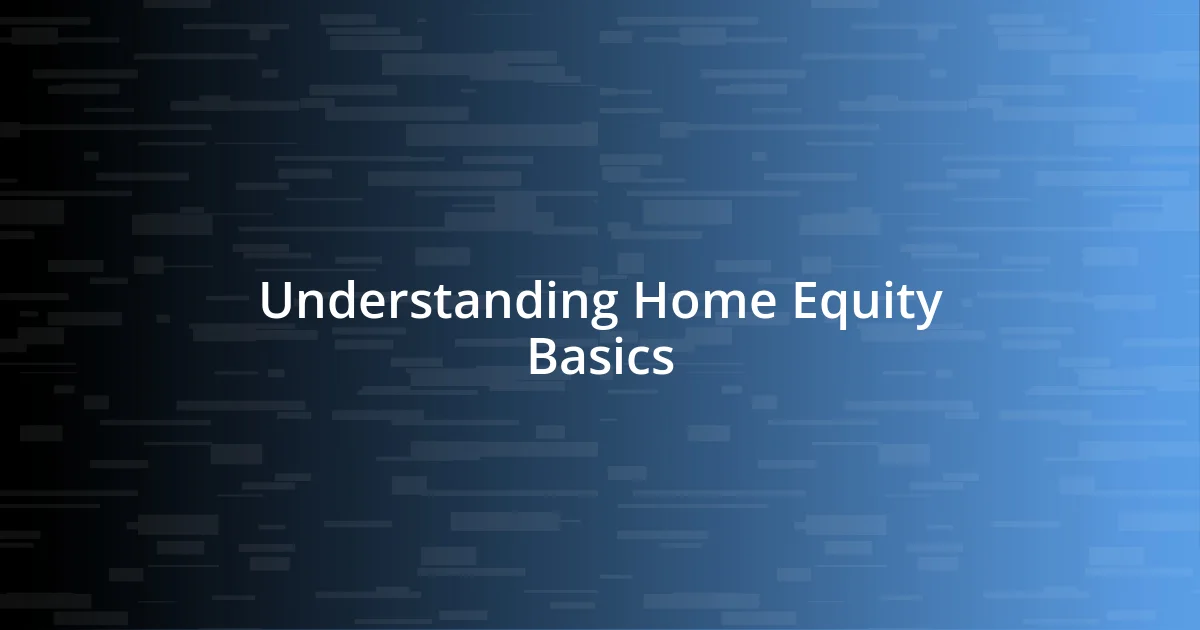
Understanding Home Equity Basics
Home equity is essentially the portion of your home that you truly own, a concept that can sometimes feel a bit abstract. I remember when I first learned about it; I was surprised to realize that this hidden asset could play such a pivotal role in my financial planning. It’s like finding unexpected cash in your pocket—suddenly, the world of possibilities opens up.
To put it simply, your home equity is calculated by subtracting the amount you owe on your mortgage from your home’s current market value. This calculation might seem straightforward, but it can greatly influence your financial decisions, especially if you’re contemplating things like home improvements or debt consolidation. Have you ever considered using your equity to invest in something larger, like a vacation home or education? Personally, I weighed the pros and cons when I thought about financing a new venture, and that perspective shift was eye-opening.
Understanding the basics of home equity is vital, especially as markets fluctuate. Just like an emotional rollercoaster, the ups and downs of your home’s value can be unsettling. I’ll never forget the moment I checked my home’s value on a popular real estate site, only to find it had appreciated significantly. Suddenly, that feeling of security transformed into a springboard for new opportunities, underscoring the importance of keeping tabs on my equity and its potential.
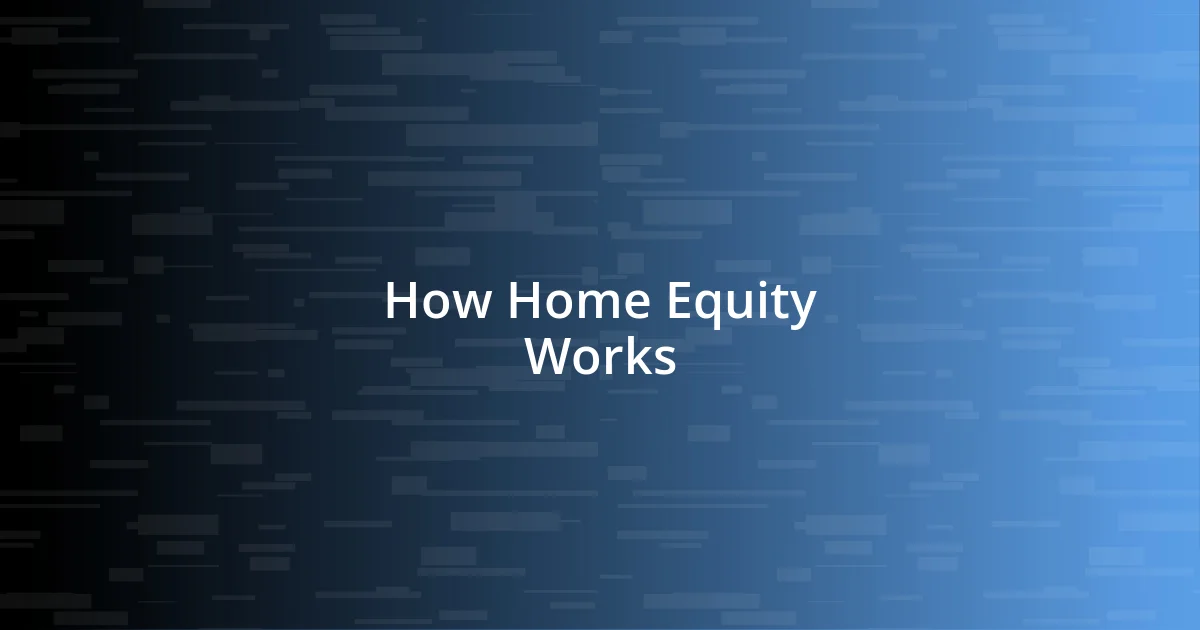
How Home Equity Works
Home equity works as a financial tool that reflects your investment in your property. I still recall the moment I first understood how it could influence my financial decisions. When I realized how much value my home had gained over the years, it felt like a light bulb clicked on—here was an asset I could tap into. Watching my equity grow, I felt empowered to make choices about renovations or perhaps starting a small business.
To put it into perspective, here’s how home equity functions:
- Market Value: The current worth of your property based on real estate trends and comparable homes.
- Mortgage Balance: The remaining amount you owe on your home loan.
- Equity Calculation: Subtract your mortgage balance from the market value—this difference represents your home equity.
As I navigated through the ups and downs, I found that keeping an eye on these numbers not only eased my financial anxiety but also inspired me to be proactive—whether that meant planning for future investments or enhancing my living space.
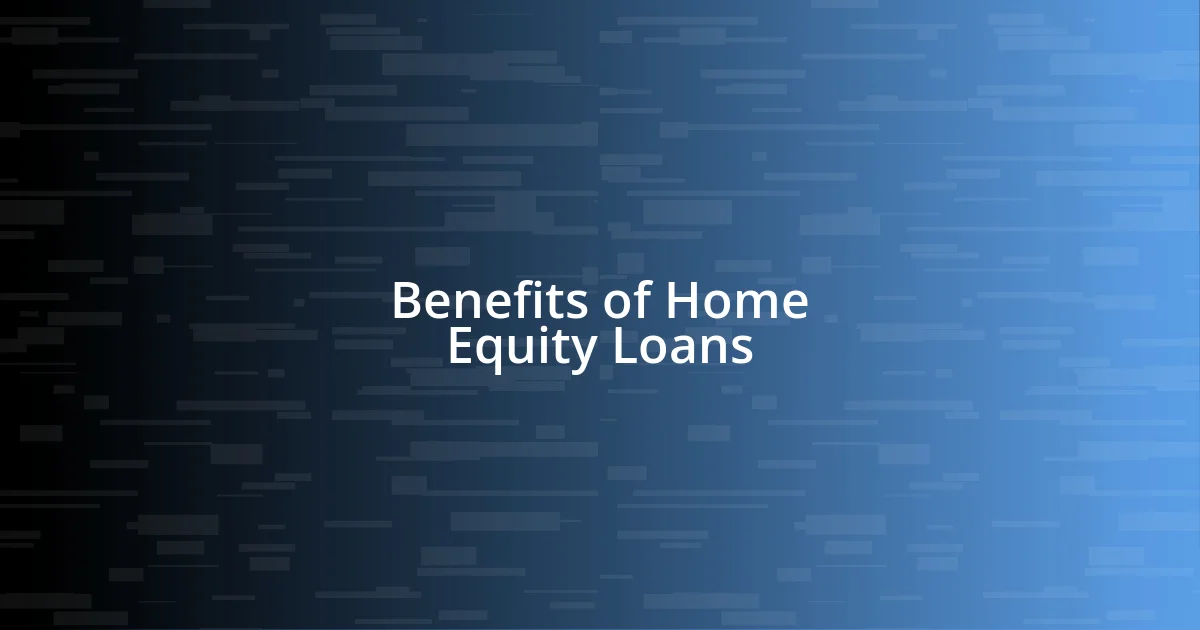
Benefits of Home Equity Loans
Home equity loans can provide a wide range of benefits that go beyond just borrowing against your home’s value. For instance, the interest rates on these loans are generally lower than those of credit cards or personal loans. I still vividly remember the relief I felt when I secured a home equity loan to fund my kitchen remodel—suddenly, the burden of high-interest debt was lifted, and I could finally create the space I’d always dreamed of.
Flexibility is another key advantage of home equity loans. You can use the funds for anything from home improvements to medical expenses or even consolidating debt. When I utilized my equity for a family vacation, it felt like I was finally rewarding myself for years of hard work. The experience was not just about the destination, but about creating lasting memories with my loved ones without the stress of financial strain.
Finally, by increasing the value of your home through improvements funded by a home equity loan, you can build even more equity in the long run. This cyclical growth is something I strive to leverage whenever possible. I can still recall the satisfaction I felt when I saw my property value rise after completing a remodel, knowing that I had invested in not just a roof over my head, but also in my future financial stability.
| Benefit | Description |
|---|---|
| Lower Interest Rates | Home equity loans generally have lower interest rates compared to credit cards or personal loans. |
| Flexible Usage | Funds can be used for various purposes, like home improvements, debt consolidation, or personal expenses. |
| Increased Home Value | Investing in your home can lead to greater equity as the property value rises. |
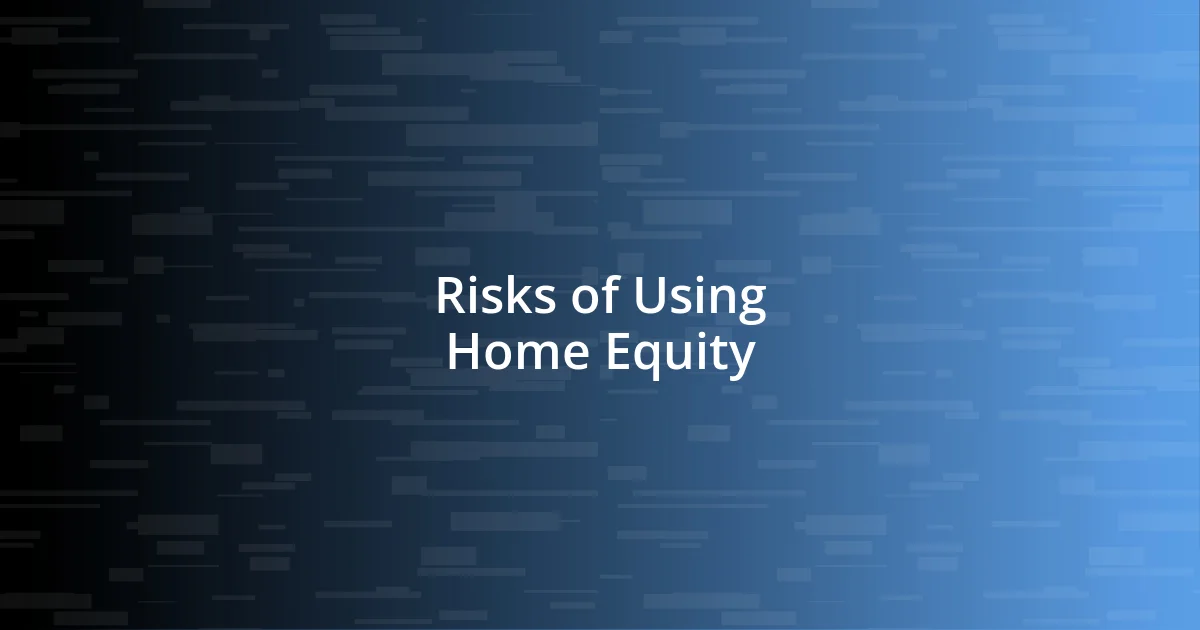
Risks of Using Home Equity
Using home equity certainly has its perks, but I’ve learned there are significant risks we can’t overlook. When I considered tapping into my home’s value, I worried about the potential for market fluctuations. What if home prices fell? Thinking about being “underwater”—owing more than my home was worth—made me second guess my decision.
I remember a friend who took out a home equity line of credit (HELOC) to fund a business venture. While the initial excitement of entrepreneurship was palpable, the stress of making monthly payments began to weigh heavily on her. It’s essential to understand that your home acts as collateral; failing to repay can lead to foreclosure. I often wonder if the potential rewards were worth the stress and risk she faced.
Another consideration is the impact on long-term financial health. If you leverage too much equity now, what will it mean for your future? I’ve found it’s all too easy to overspend when cash feels readily available. Reflecting on my experiences, a careful assessment of both immediate needs and future security is vital before making such a significant financial move.
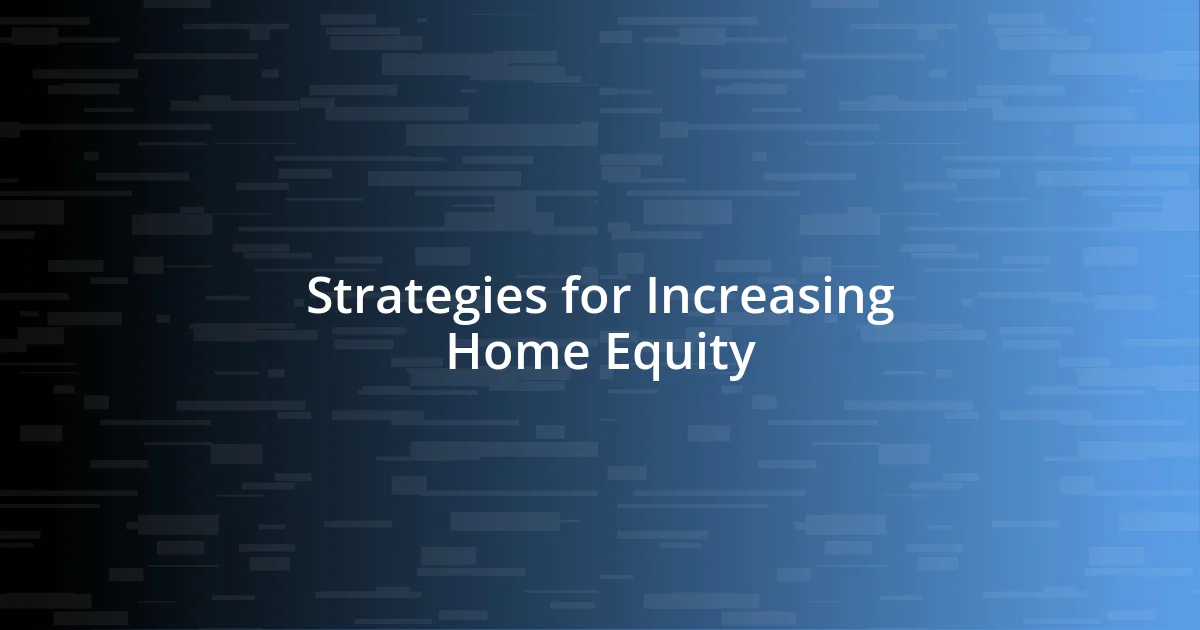
Strategies for Increasing Home Equity
When it comes to increasing home equity, one of the most effective strategies I’ve discovered is investing in home improvements. Whether it’s updating the kitchen or enhancing curb appeal, these projects can dramatically boost your home’s value. I once decided to replace my old roof, not just for aesthetics but to add long-term durability—what a difference it made in both value and peace of mind!
Another approach is to maintain your home diligently. Regular maintenance can prevent minor issues from becoming major repairs. I learned this the hard way after neglecting a small plumbing leak that eventually damaged my walls. Addressing such things early on not only preserves the home’s value but can actually save you money in the long run.
Finally, understanding your property’s market dynamics is crucial. Keeping an eye on neighborhood trends can help you make informed decisions about when to sell or renovate. I remember being taken aback by a sudden spike in my neighborhood’s property values—it felt like missed opportunities started washing over me. So, staying informed can really set the stage for maximizing your home equity and making smart financial moves.
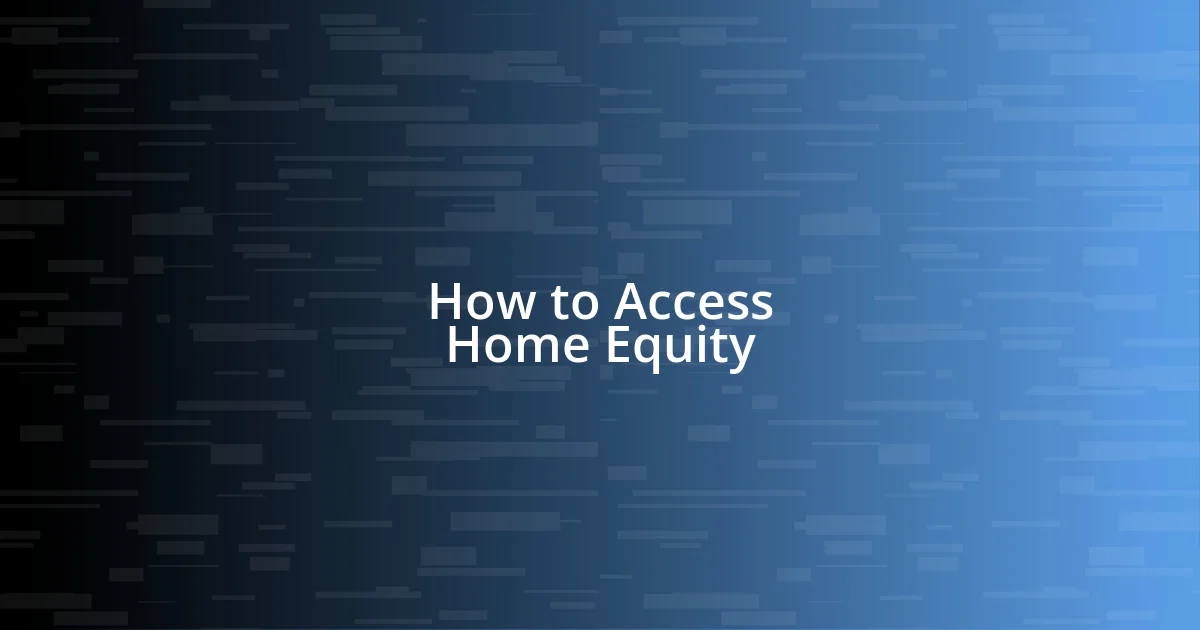
How to Access Home Equity
When it comes to accessing home equity, there are primarily two popular methods: a home equity loan or a home equity line of credit (HELOC). I remember feeling overwhelmed when choosing between the two—both had their pros and cons. A home equity loan offers a lump sum with fixed payments, while a HELOC allows you to draw only what you need as you need it, but it often comes with variable rates. Which one suits your financial situation best?
Another option I’ve explored is refinancing my mortgage. This can unlock equity while potentially lowering the interest rate on the remaining balance, making your monthly payments more manageable. I once refinanced to take advantage of a lower rate, and not only did it increase my available equity but it also gave me greater financial flexibility. Has anyone else had a similar experience?
It’s also worth noting that many lenders will let you tap into your home’s equity through cash-out refinancing. This means you can take a portion of your equity in cash while rolling the remaining balance into a new loan. I felt a mix of nervousness and excitement when I considered this—it’s like a double-edged sword. You get quick access to funds, but you also extend your mortgage. Balancing these options is crucial for any homeowner looking to leverage their equity responsibly.














